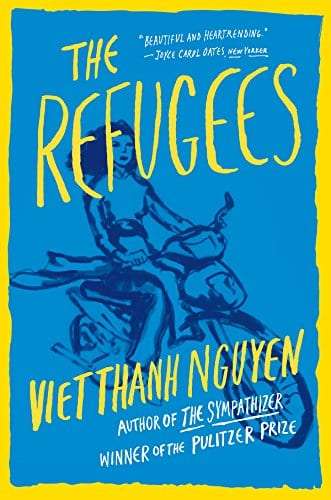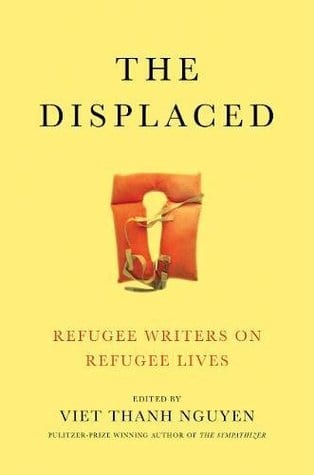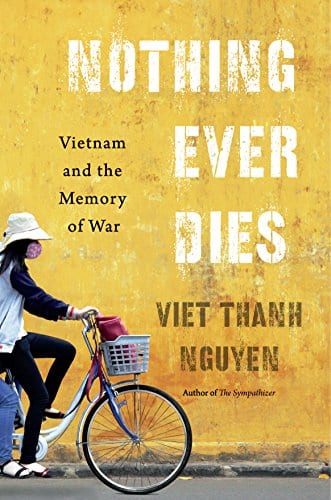Required Reading: Viet Thanh Nguyen
May 2, 2018
As part of our Required Reading series, we share a list of three essential works from SAL’s featured writers. Up this time: Pulitzer Prize-winning scholar & author of The Sympathizer, Nothing Ever Dies, & The Refugees, Viet Thanh Nguyen.
In his recent New York Times opinion piece, Viet Thanh Nguyen—the recipient of a MacArthur Fellowship, sometimes called the “Genius” Grant—flinches at the label “genius.” He writes, not without some sarcasm, “The Asian-American literary world is well established, and the path to publication is clear. Go to college, get an M.F.A. in creative writing, write about something Asian or Asian-American, be picked up by a New York publishing industry hungry for the next hot multicultural commodity and the next voice for the voiceless.”
Instead of being dubbed a “voice for the voiceless,” a solitary “genius,” or an author who “fills a void,” all of which have been used to describe Nguyen in various reviews, he’d rather the genius we celebrated more often be “a commitment to carrying out our passions in such a way that elevates all of us.” That’s the kind of (albeit generous and inclusive) take-down of the American creative scene that imbues all of Nguyen’s work, from novel, to anthology, to short story. How, they seem to ask, can our country more accurately render memory and examine our past?
You likely witnessed the tremendous buzz around The Sympathizer when it won the Pulitzer Prize in 2016, so, in this Required Reading, we’ll shine a light on some of Nguyen’s other buzz-worthy works. And, after you’ve read those, Nguyen would probably tell you not to stop there and to go read works by other Vietnamese authors. As he quipped just a few days ago at the 2018 Bay Area Book Fest: “People would ask me, ‘Have you seen that 18-hour Ken Burns documentary about Vietnam? And I would say, have you read a book by a Vietnamese person?”
The Refugees (2017)

Nguyen’s first short story collection, The Refugees, captures the experiences of people caught between two nations: the nation of birthplace, and the nation of an adopted homeland. Each country produces its own ghosts. Characters who have fled war-torn Saigon to resettle in California, from a youth who gets a surge of culture shock after moving in with two gay men in San Francisco, to a woman whose dementia-suffering husband starts confusing her for a past lover, create distinctive windows into displaced lives and the complex interpersonal hauntings that such displacement produces. At a time when it can be difficult to, say, imagine the scope of the Syrian refugee crisis, even with news reports at our fingertips, The Refugees reminds readers to engage with how it might feel and what it might mean to be a refugee.
The Displaced: Refugee Writers on Refugee Lives (2018)
 This year, Nguyen called on fellow refugee writers from Mexico, Bosnia, Iran, Afghanistan, Soviet Ukraine, Hungary, and other locations to tell their stories, resulting in the anthology The Displaced. (The publisher, Abrams Press, is donating 10% of the cover price to the International Rescue Committee, a non-profit that provides humanitarian aid and resettlement to refugees, so we recommend you buy a copy.) “I was once a refugee, although no one would mistake me for being a refugee now,” Nguyen writes in the introduction. “Because of this, I insist on being called a refugee, since the temptation to pretend that I am not a refugee is strong. It would be so much easier to call myself an immigrant, to pass myself off as belonging to a category of migratory humanity that is less controversial, less demanding, and less threatening than the refugee.”
This year, Nguyen called on fellow refugee writers from Mexico, Bosnia, Iran, Afghanistan, Soviet Ukraine, Hungary, and other locations to tell their stories, resulting in the anthology The Displaced. (The publisher, Abrams Press, is donating 10% of the cover price to the International Rescue Committee, a non-profit that provides humanitarian aid and resettlement to refugees, so we recommend you buy a copy.) “I was once a refugee, although no one would mistake me for being a refugee now,” Nguyen writes in the introduction. “Because of this, I insist on being called a refugee, since the temptation to pretend that I am not a refugee is strong. It would be so much easier to call myself an immigrant, to pass myself off as belonging to a category of migratory humanity that is less controversial, less demanding, and less threatening than the refugee.”
Nothing Ever Dies: Vietnam and the Memory of War (2016)

“Apocalypse Now is an important work of war, but that doesn’t mean I’m going to bow down before it,” Nguyen once told the New York Times. “I’m going to fight with it because it fought me.” In the scholarly exploration that took him from the U.S., to Southeast Asia, to South Korea, Nothing Ever Dies seems to close-read every possible cultural artifact: novels, films, monuments, cemeteries, prisons, art exhibits, photography, video games, souvenirs—the list goes on. Nothing Ever Dies posits that wars are fought twice, once on the battlefield, and once in the memory. These artifacts are not just to be honored behind glass, therefore; they’re to be wrestled with. If the “memory industry” of war seeks to keep power in the hands of the powerful, the text argues, then the the “ethics of remembering” forces us to always realize we’re not just victims but also perpetrators.
Tickets are still available to Viet Thanh Nguyen’s lecture on Monday, May 7, at 7:30pm at Benaroya Hall. Following the event, Jamie Ford, the author of Hotel on the Corner of Bitter and Sweet, will be moderating the audience-led Q&A. Get your tickets here!